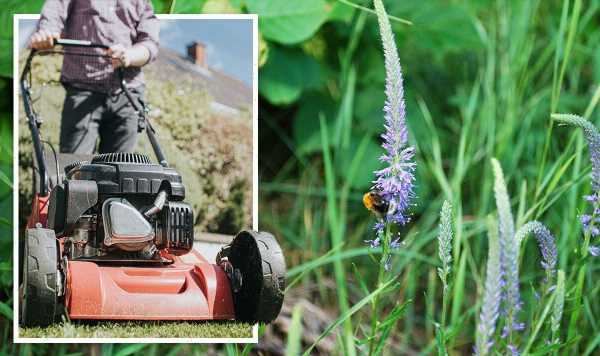Garden tips: How to maintain your lawn
We use your sign-up to provide content in ways you’ve consented to and to improve our understanding of you. This may include adverts from us and 3rd parties based on our understanding. You can unsubscribe at any time. More info
Mowing is essential for a healthy lawn, a process that encourages grass to grow thicker and blocks out weeds. However, in the month of May, gardeners are being asked not to mow their lawn in a bid to help vital wildlife.
Plantlife, a British conservation charity, launches its “No Mow May” campaign every year in a bid to help bees, butterflies and other wildlife across the UK.
According to Plantlife, the campaign No Mow May campaign “doesn’t ask you to do much.
“In fact, it asks you to not do anything at all. Just lock up your lawnmower on May 1 and let the wildflowers in your lawn bloom, providing a feast of nectar for our hungry pollinators.”


How can I get involved with No Mow may?
The annual campaign kicks off this year on April 29, 2022 and all you have to do is let your lawn grow freely for the entire month
Set up like a challenge, throughout the month gardeners can track their progress and share results at the end.
At the end of the month, you can count the flowers on your lawn to take part in the conservation charity Plantlife’s Every Flower Counts survey.
You will then receive your own Personal Nectar Score, which tells you how many bees your garden is helping to support.
DON’T MISS
Deadheading: 6 types of garden plants to deadhead regularly [INSIGHT]
Princess Beatrice & Sienna seen heading to St James’s Palace – inside [REVEALED]
House prices: The 10 UK property ‘hotspots’ [REPORT]
How does No Mow May help wildlife?
The impetus behind No Mow May is to give pollinators, like bees, more time to undertake their work.
The mow-free period allows more flowers to grow so pollinators can collect more nectar.
Postponing your mowing session until June can help plants create enough nectar for up to 10 times more beers and other pollinators.
Pollinators are essential for our crops and in fact, almost 90 percent of wild plants and 75 percent of leading global crops depend on animal pollination, according to WWF UK.
Get the latest three-day weather forecast where you live. Find out by adding your postcode or visit InYourArea
Furthermore, one out of every three mouthfuls of our food depends on pollinators.
Crops that depend on pollination are five times more valuable than those that do not.
Unfortunately, according to the Royal Horticultural Society (RHS): “There is evidence that populations of bees and other pollinators are less healthy and abundant than they have been.
“If action is not taken, pollinator declines will have serious implications for biodiversity, food production and the ornamental garden.”
Source: Read Full Article
